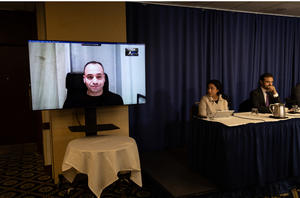
After weeks of torture, Benabderrahmane was transferred to solitary confinement at Salwa Road Prison, where he remained for five more months.
WASHINGTON, DC, November 28, 2024 /24-7PressRelease/ -- Lawyers, human rights defenders, and concerned citizens gathered at the National Press Club in Washington, DC, to highlight critical issues of arbitrary detention and judicial misconduct in Qatar. Hosted by the Capitol Institute, the event centered on the harrowing case of Tayeb Benabderrahmane, a French geopolitical and economic consultant whose detention and torture by Qatari authorities have sparked international outrage.
The event featured a distinguished panel of legal experts, human rights advocates, and analysts, each bringing unique insights into the systemic injustices prevalent in Qatar's legal and political systems. Joining the discussion virtually, Benabderrahmane recounted his traumatic experience, underscoring the urgent need for accountability and reform.
The Case of Tayeb Benabderrahmane
Tayeb Benabderrahmane, a respected French business director with over two decades of expertise in geopolitical consultancy, gained recognition for his work during Qatar's diplomatic crisis in 2017. Serving as a senior advisor to Qatar's National Human Rights Committee, Benabderrahmane was instrumental in anti-corruption initiatives and intelligence-gathering efforts to support Qatar during a regional blockade.
However, his career took a devastating turn in 2020 when Qatari security forces arrested him on January 13 without explanation or charges. International human rights lawyer Luke Vidal, who has worked closely with Benabderrahmane for three years, provided a detailed account of his client's ordeal:
"Tayeb was a respected professional, actively supporting Qatar during a critical period in its history. Yet, in 2020, his life was turned upside down when he was brutally detained without cause, his assets seized, and his freedom stripped away," Vidal stated.
Benabderrahmane endured weeks of isolation, torture, and psychological threats at a secret detention center, where Qatari authorities sought to extract sensitive information. Vidal revealed that these threats extended to his family, amplifying the psychological toll of his detention.
After weeks of torture, Benabderrahmane was transferred to solitary confinement at Salwa Road Prison, where he remained for five more months. His eventual release in June 2020 came with coercive conditions, including surrendering all professional documents and enduring house arrest for four months. Despite being allowed to leave Qatar in October 2020, his legal battles continued, culminating in a death sentence in absentia by a Qatari court in May 2023 on unsubstantiated charges of espionage.
A Flawed Legal System
The panelists highlighted how Benabderrahmane's case reflects broader systemic flaws in Qatar's legal framework. Aaron Eitan Meyer, a New York-based attorney and analyst, emphasized the lack of transparency and accountability in Qatar's judiciary system.
"Qatar's legal system is designed to suppress dissent and deny justice. This case demonstrates how due process can be manipulated to serve political and personal vendettas," Meyer said.
Benabderrahmane sought redress through international legal mechanisms, including a case with the World Bank under the International Convention for the Settlement of Investment Disputes. This case marked the first instance in which procedural orders forced Qatar to disclose limited details about his detention. However, these efforts have faced significant retaliation, including fabricated charges and a death sentence.
Broader Implications of Qatar's Actions
Panelist Irina Tsukerman, a human rights attorney specializing in national security, criticized Qatar's use of coercive diplomacy to silence dissent and shield itself from accountability:
"Qatar has blackmailed and extorted governments into ignoring human rights violations. They manipulated legal systems to fabricate evidence against Tayeb and suppress the truth," Tsukerman argued.
She pointed to the broader implications of Qatar's actions, warning that such practices set a dangerous precedent for other authoritarian regimes.
A Call for Justice
The event concluded with passionate calls for justice and accountability. Andy Vermont a defender with the World Council for Public Diplomacy, condemned Qatar's actions, describing them as a blatant violation of international human rights standards:
"This is not justice; it's cruelty. Qatar signed the UN Convention Against Torture but blatantly violated it. They choose falsehood over fairness and expect the world to accept it—but we won't," Vermont declared
Vermont underscored the symbolic weight of Benabderrahmane's case, framing it as representative of countless individuals silenced by fear and repression:
"This story is about more than one man. It's about a regime hiding its flaws through lies and intimidation. We must stand for fairness, truth, and dignity because justice demands it."
The Capitol Institute
---
Press release service and press release distribution provided by https://www.24-7pressrelease.com














